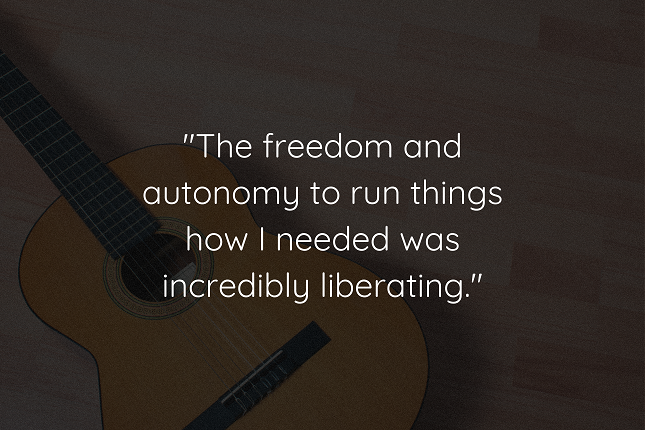Loving your job as a contractor

Reluctant Capitalist
I never wanted to be in private practice. As a bleeding heart lefty with rampant imposter syndrome, the idea of directly charging people for my services really stuck in my craw. How would I even set a fair price for what I do? How could I bring myself to put my hand out for payment at the end of the session when the people I’m working with might be having a really tough time? What about all the people I’ve worked with who could never afford the professional help they really needed?
It all seemed so foreign, unnatural and unfair, and I never wanted to go there. In the old days of block funding before NDIS came about, despite all the many difficulties in the system, I felt lucky to be able to provide service to whoever came along in need, no matter where they were, how much money they had, their ability to advocate for themselves, or what they needed to make the work meaningful and effective. I felt that I had an excellent home in my workplace, and I was preparing myself to stick around there 'til the end of my career.
The NDIS represented a seismic shift in the way service was provided to people with disabilities. As was famously said at the time, NDIS was still being built even as it was taking off, and it was really hard for service providers to get their heads around how to survive and thrive in a way that allowed them to continue to help the people they wanted to serve. The new model was driven by a philosophy of individualised funding and of choice and control, which felt very much like the right thing to do. Like everything in life, it had a flipside. Service providers were now competing in a marketplace to provide the service and access the funding, and this had some less desirable effects.
A Brief History of My Time
The organisations I worked at in the early days of the NDIS rollout are good ones. I want to make that clear. I’m not casting stones at either these organisations or the NDIS itself. It is my experience that the adjustment to individualised funding created some challenges for service providers, and some of the decisions made based on the shifting sands of information at the time created some situations which, in short, hurt me deeply, including:
- Competent, excellent colleagues with great experience and a track history of amazing results not being allowed to continue in behaviour support roles because of a perception they were not qualified under the new framework;
- Personally being deemed not qualified for the role I had held for a decade (this was based on a word in a table, and put a spanner in the works of a job I loved. I was later found to in fact be qualified, but the damage was done by that point);
- The introduction of billable hours targets, and the prioritisation of meeting these targets over all else, including quality of service and treating the people we serve with the respect due to them; and
- Being asked to provide behaviour support services in a clinic setting to save on travel time, rather than in the settings meaningful to my clients.
This, to me, felt predatory, mercenary, and a selling out of the values which had attracted me to work with these organisations. I was miserable, angry, and in good conscience, I could not stay. I had to get out.
Taking a role outside of NDIS service provision felt like a breath of fresh air. Being able to focus on the quality of the work over the revenue it generated was exactly what I had missed. However, helping people overcome barriers to living their best lives, in the community settings where they worked, played, learned, suffered and thrived, was always my passion. The work I loved called to me again, irresistible as a siren song.
The Power of Blog
I came across a blog post on LinkedIn by Ability Consultants, talking about providing a service within the NDIS framework in a way that prioritised the human beings we’re here to help, with a focus on maximising freedom and social connection through access to Positive Behaviour Support services. Exactly what I dreamed of. I had to know more. After a couple of brief chats with Ability Consultants, I knew I had to dive back into service provision under the NDIS.
It was a scary move. I had to set myself up as a business and charge directly for my time. What if I wanted time off? What if I got sick? There is no leave for a contractor. And the old feeling: I’m not worth that much per hour! And also that old feeling: Isn’t this all a bit mercenary? And further: what if once again I find myself in a situation where economic considerations mean I’m not able to work according to the values I feel I need to live by?
I took a deep breath and jumped, determined to find out if it was possible to provide a quality service within the context of the NDIS funding model. This time, when I jumped, I flew.
My Own Balance
The key, for me, is a mix of support and autonomy. The flexibility of the workplace as a contractor is infinite. If I ever found myself awake at 3 am unable to sleep thinking about a client, I could act on this straight away by working on documents and resources to help progress the service. If this meant I needed to crash out during the day for a bit, that wasn’t a problem. If I needed a mental health day, I just didn’t schedule anything for that day. This level of freedom and autonomy to run things how I needed was incredibly liberating. The only monetary pressure involved was making sure I did enough work to pay the bills, and besides that, the only consideration was concentrating on doing the best job I could. I could finally place my focus where it belongs: on my clients. Yes!
Support: The Real Thing
The support available is top-notch. Having people around you to bounce ideas off, to problem-solve with, to help you progress your learning, and to provide mutual support has always been something I’ve valued hugely. At Ability Consultants, I found this in spades. Weekly catch-ups with a mentor (and availability outside that time as needed), a culture of openness to supporting each other, and a focus on looking after yourself and others so we can look after our clients are of infinite value to me, and I found my feet very quickly.
Another exciting part of working at Ability Consultants is that good ideas are valued and nurtured. There is a collective drive to constantly grow, learn and improve. Ideas about how to achieve this are usually met with curiosity, excitement, and a willingness to invest time and resources into trying it. There are always heaps of projects on the go, and I have really valued the opportunity to have my voice heard when it comes to helping everyone to do high-quality work.
Fertile ground
So, there’s my tale… the battered old warhorse finding new life on the fertile grounds of Ability Consultants. It can be done. I hope this story helps others who might have had a similar journey, or who are looking for hope in a world that seems to value only the dollar. I’d love to chat with you if your experience has been the same as mine or if you’re struggling to find a workplace you can call home.
Get in touch and join our team.





